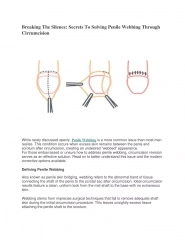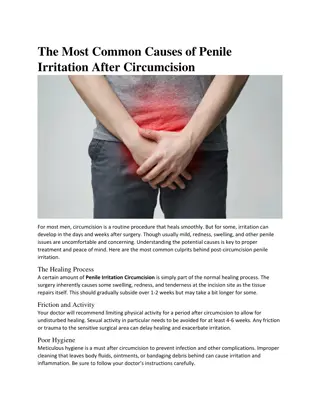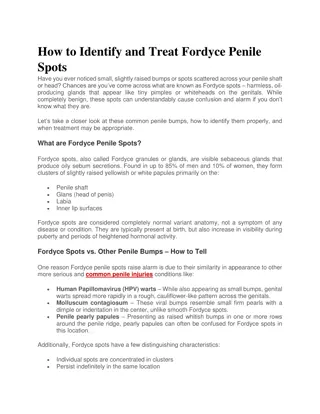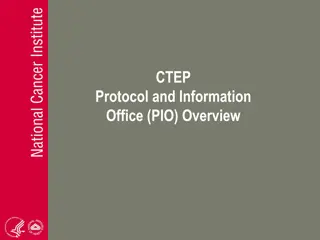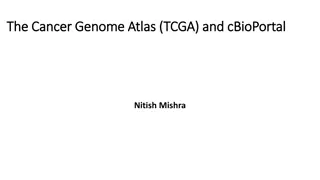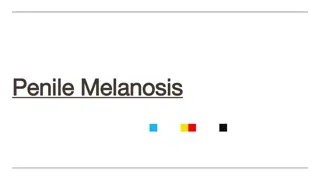Updated Guidelines for Penile Cancer Management in November 2021
The updated guidelines for penile cancer management emphasize the importance of a specialist penile cancer team for all operations, the necessity of regular MDT meetings, and the terminology change to classify cases under Penile Intra-epithelial Neoplasia. The clinical pathways stress referrals to designated centers and the use of organ-sparing surgery where oncologically safe. Overall, the guidelines aim to streamline care and improve outcomes for penile cancer patients.
Download Presentation

Please find below an Image/Link to download the presentation.
The content on the website is provided AS IS for your information and personal use only. It may not be sold, licensed, or shared on other websites without obtaining consent from the author. Download presentation by click this link. If you encounter any issues during the download, it is possible that the publisher has removed the file from their server.
E N D
Presentation Transcript
Updated Supra-Regional Penile Cancer Guidelines November 2021 Aditya Manjunath Consultant Urological Surgeon North Bristol NHS Trust
Demographics Unchanged Referrals from SWAG, Three Counties and Peninsula networks Population approximately 5 million people Updates What has changed? Personnel NHS England penile cancer care guidelines 2019 Clinical pathways Follow up
NHS England 2019
Supra-network care All operations to be carried out at host MDT site in single hospital by specialist penile cancer team All penile cancer cases must be discussed at MDT to ratify treatment Team Minimum 2 surgeons Clinical/medical oncologist CNS Specialist Radiology/Pathology Allied teams Palliative care, Psychological support, Lymphoedema support etc Summary of NHSE Service Specification 2019
Need to be referred urgently Biopsy preferable but if clinically obvious tumour we would accept patients without biopsy If phimosis and extent of tumour not easily assessed dorsal slit and biopsy should be performed Avoid circumcision in penile cancers makes definitive organ sparing surgery and reconstruction more difficult and less successful Weekly MDT meeting (Wednesday PM) 2 week cycle 3 x penile clinics and 7 x operating lists to see and treat patients Clinical pathway Referral to NBT penile cancer centre
Terminology change All cases under umbrella histological term Penile Intra-epithelial Neoplasia (PeIN) 2 x types Undifferentiated HPV driven, higher chance of invasive malignancy Differentiated low risk for malignant transformation Clinical pathway Pre- malignant lesions
Organ sparing surgery where oncologically safe to do so Surgical margin of >1mm appears to be safe (Sri et al, 2018) Simultaneous reconstruction offered to all patients Some data to show benefit in patients who are sexually active Penile MRI scan not required in all patients, if done then must be done with artificial erection Clinical pathway treatment of primary tumour
Clinical pathways management of inguinal/pelvic nodes Clinically non palpable nodes (cN0) Clinically palpable inguinal nodes (cN+) Pelvic lymph nodes Patients with intermediate or high risk primary penile tumours Offered inguinal dynamic sentinel node biopsy (DSNB) Current facility at NBT for one case per week Currently open radical inguinal lymph node dissection Medium term intend to move towards minimally invasive inguinal node dissection Offer robotic ipsilateral pelvic lymph node dissection in patients with pN3 inguinal node disease (in suitable patients)
Neoadjuvant chemotherapy in bulky, fixed inguinal node mass Adjuvant chemotherapy or radiotherapy in patients with pN2 and pN3 inguinal or pelvic nodal disease Oncological therapies and research Research trials: InPACT randomised multicentre study looking at management of palpable inguinal nodes Oncology trial in locally advanced/metastatic disease EPIC trial
Follow up (tables in guidelines) Risk stratified follow up based on T stage and N stage


